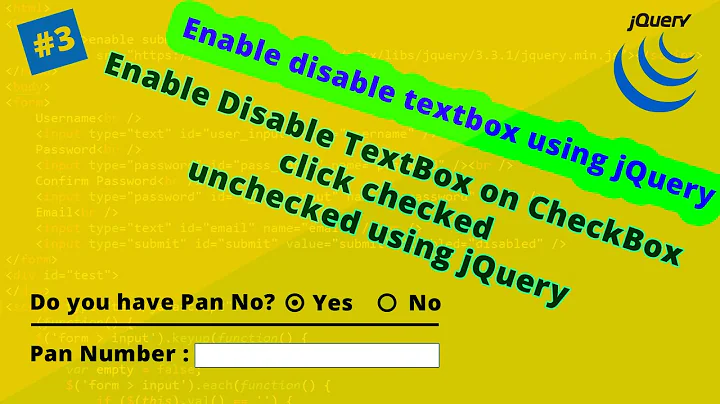Set disable attribute based on a condition for Html.TextBoxFor
Solution 1
The valid way is:
disabled="disabled"
Browsers also might accept disabled="" but I would recommend you the first approach.
Now this being said I would recommend you writing a custom HTML helper in order to encapsulate this disabling functionality into a reusable piece of code:
using System;
using System.Linq.Expressions;
using System.Web;
using System.Web.Mvc;
using System.Web.Mvc.Html;
using System.Web.Routing;
public static class HtmlExtensions
{
public static IHtmlString MyTextBoxFor<TModel, TProperty>(
this HtmlHelper<TModel> htmlHelper,
Expression<Func<TModel, TProperty>> expression,
object htmlAttributes,
bool disabled
)
{
var attributes = new RouteValueDictionary(htmlAttributes);
if (disabled)
{
attributes["disabled"] = "disabled";
}
return htmlHelper.TextBoxFor(expression, attributes);
}
}
which you could use like this:
@Html.MyTextBoxFor(
model => model.ExpireDate,
new {
style = "width: 70px;",
maxlength = "10",
id = "expire-date"
},
Model.ExpireDate == null
)
and you could bring even more intelligence into this helper:
public static class HtmlExtensions
{
public static IHtmlString MyTextBoxFor<TModel, TProperty>(
this HtmlHelper<TModel> htmlHelper,
Expression<Func<TModel, TProperty>> expression,
object htmlAttributes
)
{
var attributes = new RouteValueDictionary(htmlAttributes);
var metaData = ModelMetadata.FromLambdaExpression(expression, htmlHelper.ViewData);
if (metaData.Model == null)
{
attributes["disabled"] = "disabled";
}
return htmlHelper.TextBoxFor(expression, attributes);
}
}
so that now you no longer need to specify the disabled condition:
@Html.MyTextBoxFor(
model => model.ExpireDate,
new {
style = "width: 70px;",
maxlength = "10",
id = "expire-date"
}
)
Solution 2
Actually, the internal behavior is translating the anonymous object to a dictionary. So what I do in these scenarios is go for a dictionary:
@{
var htmlAttributes = new Dictionary<string, object>
{
{ "class" , "form-control"},
{ "placeholder", "Why?" }
};
if (Model.IsDisabled)
{
htmlAttributes.Add("disabled", "disabled");
}
}
@Html.EditorFor(m => m.Description, new { htmlAttributes = htmlAttributes })
Or, as Stephen commented here:
@Html.EditorFor(m => m.Description,
Model.IsDisabled ? (object)new { disabled = "disabled" } : (object)new { })
Solution 3
I like Darin method. But quick way to solve this,
Html.TextBox("Expiry", null, new { style = "width: 70px;", maxlength = "10", id = "expire-date", disabled = "disabled" }).ToString().Replace("disabled=\"disabled\"", (1 == 2 ? "" : "disabled=\"disabled\""))
Solution 4
One simple approach I have used is conditional rendering:
@(Model.ExpireDate == null ?
@Html.TextBoxFor(m => m.ExpireDate, new { @disabled = "disabled" }) :
@Html.TextBoxFor(m => m.ExpireDate)
)
Solution 5
If you don't use html helpers you may use simple ternary expression like this:
<input name="Field"
value="@Model.Field" tabindex="0"
@(Model.IsDisabledField ? "disabled=\"disabled\"" : "")>
Related videos on Youtube
Ghooti Farangi
Updated on June 06, 2020Comments
-
Ghooti Farangi almost 4 years
I want to set disable attribute based on a condition for Html.TextBoxFor in asp.net MVC like below
@Html.TextBoxFor(model => model.ExpireDate, new { style = "width: 70px;", maxlength = "10", id = "expire-date" disabled = (Model.ExpireDate == null ? "disable" : "") })This helper has two output disabled="disabled " or disabled="". both of theme make the textbox disable.
I want to disable the textbox if Model.ExpireDate == null else I want to enable it
-
Extragorey about 7 yearsHave a look at my answer here: stackoverflow.com/a/43131930/6680521
-
-
Ghooti Farangi almost 13 yearsI want to disable the textbox if Model.ExpireDate == null else I want to enable it
-
 Mir over 11 yearsThis solution is great - as far as it goes... but it would be nice to find a clean solution that doesn't require putting a wrapper around every HtmlHelper we use that might have a disabled attribute (TextBoxFor, TextAreaFor, CheckBoxFor, etc.) Ideally something that works inline with the existing ones. I've built a solution that basically just wraps the anonymous object and returns a RouteValueDictionary - but it doesn't feel especially clean.
Mir over 11 yearsThis solution is great - as far as it goes... but it would be nice to find a clean solution that doesn't require putting a wrapper around every HtmlHelper we use that might have a disabled attribute (TextBoxFor, TextAreaFor, CheckBoxFor, etc.) Ideally something that works inline with the existing ones. I've built a solution that basically just wraps the anonymous object and returns a RouteValueDictionary - but it doesn't feel especially clean. -
Shautieh over 10 years"disabled", "disabled=''" and "disabled='disabled'" are all equally valid in html, and it is misleading (and false) to say that the shorter ones might only be accepted by the different browsers. Cf. dev.w3.org/html5/markup/syntax.html#syntax-attr-empty
-
Geeky Guy over 7 yearsIf you use the disabled attribute in a control, the control will be disabled no matter what value the attribute has. Even the presence of the attribute without a value will disable the control.
-
Jozef Krchňavý about 7 yearsWorks if you change rawstring.Length - 2 for 7 and add " " after last ".
-
 Shadi Alnamrouti over 6 yearsI think you should surround this with @Html.Raw()
Shadi Alnamrouti over 6 yearsI think you should surround this with @Html.Raw() -
Carsten over 6 yearsThis solution works really well, and I suspect downvoters may have overlooked that the expression is boolean. When the expression is boolean, the disabled attribute will render as disabled="disabled" if the expression is true, or be completely omitted if false. Which is exactly what you want.
-
 Andez over 5 yearsThis will either render disabled="false" or disabled="true", no?
Andez over 5 yearsThis will either render disabled="false" or disabled="true", no? -
erhan355 over 5 yearsDoesn't work with TextAreaFor, need a solution for all kind of input types
-
Carmine Checker about 4 years@Html.EditorFor(m => m.Description, Model.IsDisabled ? (object)new { disabled = "disabled" } : (object)new { }) => this seems the best way. Thanks
-
RasikaSam about 4 yearsIMHO, this is the best answer











